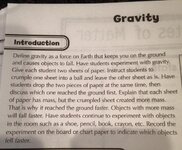Wiploc
Veteran Member
Where would one live to have the ground be flat all around them as far as the eye could see?Why would you need to demonstrate that? Gravity is apparent, maybe not explained, but stuff settles down... for whatever reason. No one would live parallel to the surface of Earth.I have heard about the cattle being thought of as growing as you walked closer.
I also read long ago that before gravity was discovered to exist. People thought things were stuck to the ground not because some force was pulling you down but because the Earth was moving up.
Speaking of gravity.....
If you lived before the discovery of gravity how do you explain that if Earth was a ball why doesn't all of the water fall off.
This is way too scientific of an argument. A person that long ago is arguing the earth is flat, because the ground around them is as flat as the eye can see.A flat earth fellow living before gravity was discovered--
"If you pour water onto a ball 10 to the zillion billionth times the water falls off . Therefore the earth cannot be a ball"
Diskworld.


